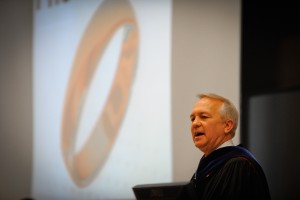Undergraduate Programs
Bachelor of Science in Aerospace Engineering
| Career Focus | The Aerospace Engineering degree program prepares its graduates for careers in aircraft and space systems design, analysis and manufacturing.
Aerospace engineering is the application of science and engineering principles to the design, development, and implementation of systems or vehicles that travel above the surface of the earth. These vehicles may include low-speed propeller-powered aircraft, high-speed jet-powered aircraft, remotely piloted vehicles, micro air vehicles, hovercraft, and helicopters, as well as rockets, spacecraft, space stations, planetary rovers, and such specialty equipment as heat shields and other protective and deployment devices. The design of these vehicles and systems is both difficult and challenging because they must operate reliably and efficiently in harsh environments. Aerospace engineering is intimately involved in the design, manufacture, control, and operation of these systems coupled with a consideration of environmental, economical, ethical, and social issues. |
|
| AE Program Educational Objectives | In collaboration with representatives of the significant constituency groups, including students, graduates, employers and others, the faculty of the department developed the following two program educational objectives (PEOs) for mechanical engineering (https://mae.ncsu.edu/about).Within a few years after graduation, alumni of the Aerospace Engineering program will: 1. contribute to solving the engineering challenges that face our society, and 2. lead successful and productive careers in the engineering fields, and/or pursue further study in engineering or other fields such as medicine, business and law. |
|
| Curriculum and Advising | ||
| Credit Hours to Graduate | 127 | |
| Areas Of Study |
|
|
| Senior Design Project |
|
|
| Accelerated Tracks | 5-year BS/MS Degree | |
| Jobs and Salary | Aerospace Engineers Occupational Outlook and Salaries – Bureau of Labor Statistics |
Bachelor of Science in Mechanical Engineering
| Career Focus | The Mechanical Engineering degree program prepares its graduates for careers in mechanical and thermal systems design, analysis and manufacturing.
Mechanical engineering involves practical application of mechanical and thermal sciences to research, design, development, testing and manufacturing of a wide variety of products. Mechanical engineers contribute to the fields of transportation, power generation and energy conversion, environmental control and pollution abatement, noise control, and biomechanics. Recent developments have increased interest in such areas as robotics, mechatronics, precision engineering, automated manufacturing systems, combustion and propulsion. Student projects include Mini Baja, Formula Cars, and walking machines. |
| ME Program Educational Objectives | In collaboration with representatives of the significant constituency groups, including students, graduates, employers and others, the faculty of the department developed the following two overall program educational objectives (PEOs) for mechanical engineering (https://mae.ncsu.edu/about).
Within a few years after graduation, alumni of the Mechanical Engineering program will: |
| Curriculum and Advising | |
| Credit Hours to Graduate | 126 |
| Areas Of Study |
|
| Senior Design Project | The ME capstone senior design project is an industry-sponsored project. Students receive training on machining, fabrication and other manufacturing processes. Students design-build-test to given requirements, and compete with other student teams to produce the best product. |
| Accelerated Tracks | 5-year BS/MS Degree |
| Jobs and Salary | Mechanical Engineers Occupational Outlook and Salaries – Bureau of Labor Statistics |
What else adds value to our degrees?
- Professional Organizations and Honoraries to engage and network outside the classroom.
- Study Abroad and international engineering programs for global exposure and understanding.
- Undergraduate Research to acquire the investigative skills of a researcher.
- Cooperative Education (Co-op) and Internships to work in the profession while getting your degree.
- Professional Engineer (PE) Licensure for broader certification in the field.
- Order of the Engineer: Introduction to the Profession to join the professional engineering community.
- Engineering Career Fair for exploring job possibilities and finding your future employer.
